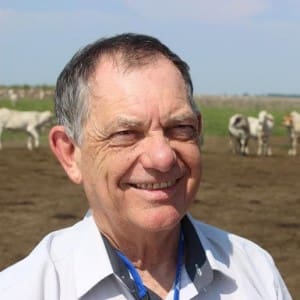AUSTRALIA should take the lead to instigate an international body representing livestock exports, according to World Organisation for Animal Health (OIE) director general Dr Bernard Vallat.
“Australia’s investments in improving animal welfare are welcomed and taking those improvements to the rest of the world certainly has OIE’s support,” Dr Vallat said at the LIVEXchange conference in Darwin last week.
“Governments, the private sector and international organisations can work together to successfully address societal expectations for animal welfare.”
Fellow speaker Dayne Pratzky, the Australian anti-fracking activist known colloquially as ‘The Frackman’, challenged the livestock export sector to respond to groups opposed to the industry.
“Get your stories out there, change the narrative,” Mr Pratzky said.
“It’s great to see the live export industry taking animal welfare seriously.
“It’s clear to see – the industry is learning and listening.”
After an ESCAS supply chain tour in Indonesia and northern Australia, LIVEXchange keynote speaker and world-renowned animal welfare specialist Professor Temple Grandin said it was “possible to do the right thing in Indonesia, even with relatively simple equipment.”
She noted that modern animal welfare practices and good genetics had improved health outcomes for cattle through the supply chain, but breeding programs needed to continue to take into account an animal’s susceptibility to heat stress and other physical risk factors.
Australian Livestock Exporters’ Council chairman Simon Crean heralded LIVEXchange as a major success.
“One of the key messages from our international guest speakers has been how highly regarded the Australian livestock export industry is by the rest of the world, which is a significant strategic strength that should be taken advantage of,” Mr Crean said.
“The Australian livestock export industry should be very proud of where it sits, but not so proud that it ever becomes complacent about the need for continual improvement across the industry.”
Schuster Consulting’s Peter Schuster made a presentation about the Livestock Global Assurance Program (LGAP), which is being piloted in livestock export markets. The program is being developed as a global assurance, certification and conformity assessment program to foster world’s best practice in the welfare and management of livestock in markets across the world.
LIVEXchange concluded with a gala dinner, when Emanuel’s Ben Stanton was announced as the Young Achiever of the Year Award and Bjørn Clausen was the latest recipient of the industry’s Lifetime Achiever Award. A special charity auction conducted at the dinner raised $61,800 to assist Rotary’s work with the Rawinala Foundation in Indonesia.
Source: Australian Live Exporters’ Council


To Katrina Love: Thank you for joining the conversation and your concerns for the welfare of our animals. I was just wondering where you got your statistics from?
Regards
Mr Pratzky says “it’s great to see the live export industry taking animal welfare seriously”. If either industry or the government were taking animal welfare seriously, we wouldn’t be exporting live animals overseas for slaughter or breeding. Or at the very least, LSS would no longer be issued with permits to export.
Twelve years after Animals Australia first exposed the practice of shoving sheep in car boots in Middle Eastern summers, we are still seeing this happen, despite industry saying (for about the past nine years) that they are aware of it and working to stop it.
Around 30 percent of animals exported live for slaughter every year will have their throats cut whilst fully conscious. That is not good animal welfare in anyone’s book. Pre-stunning, even if reversible, should be mandatory for any countries that want to import live animals from Australia. Religious or cultural preference must never come before animal welfare.
All animals that set foot on a ship or plane for export face at the very least, increased stress and trauma, and at the worst we have seen so far, horrendous voyages, suffocating on planes, nightmarish handling and slaughter methods including tendon-slashing, eye-gouging, tail-breaking and flooding — even knee-capping with an assault rifle. Therefore, the live export industry has a 100pc record of poor animal welfare outcomes compared to animals slaughtered in Australia, to Australian standards, under Australian law.